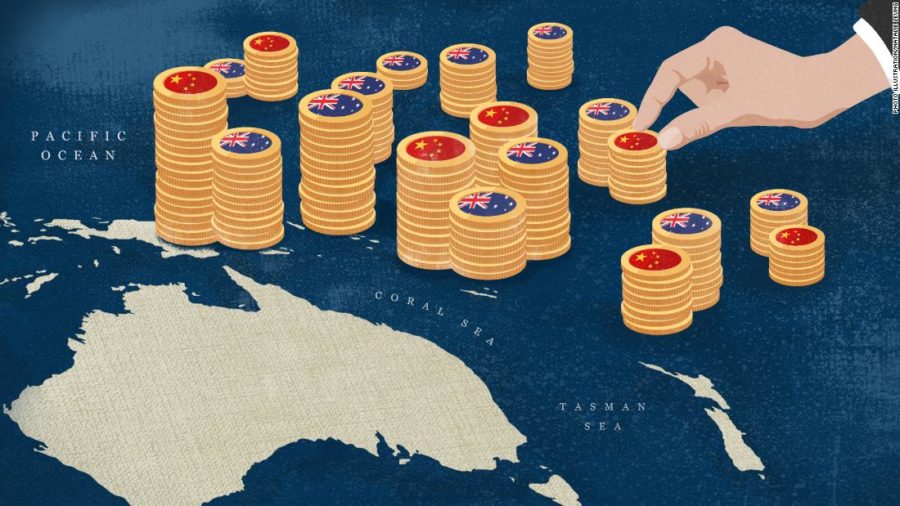Chinese Presence in the Pacific
September 7, 2022
Geopolitical tensions are high with China, making agreements with many Pacific nations. These agreements are with places such as Vanuatu, the Soloman Islands and Tonga, and range from security agreements to preferential loans. While it is not Australia’s place to dictate the nature of agreements between sovereign nation-states, as a member of the international pacific community and being concerned for the wellbeing and future of our international neighbours, Australia’s concerns stem from questions surrounding the nature of these agreements and Chinese expansionism.
In a recent press conference, the Chinese ambassador to Tonga valiantly denied participating in “debt trap” diplomacy in the Pacific nations, stating that if an indebted nation cannot repay its loans “we can talk and negotiate in a friendly, diplomatic manner.” But this “friendly, diplomatic manner” has not always been displayed by China especially after its takeover of a Sri Lankan port after they could not repay their debts. When asked about this the Chinese ambassador stated that “I don’t think we can compare these two preferential loans because every country has its own unique conditions. Tonga’s national condition and status cannot be compared to Sri Lanka.”
Some of these concerns aren’t held solely by Australia but have also been expressed by Jacinda Ardern (The PM of New Zealand) when she made a joint statement with President Joe Biden saying, “The establishment of persistent military presence in the Pacific by a state that does not share our values or security interests would… pose national-security concerns”
While concerns regarding military presence are somewhat obvious, concerns for the development of our neighbouring nations are also at the forefront of our nation’s mind as these major investments China is making in these much smaller and less economically developed countries have not been going towards the betterment of the people’s lives, instead, they have been going into massive infrastructure projects that have minimal benefits to those who inhabit these nations.
The newly appointed Minister of Foreign Affairs, Penny Wong, recently went on a tour of the Pacific regions to reconcile a positive contribution to the nation’s development. She said in a statement, “I look forward to listening to leaders in Samoa and Tonga about how the Australian government can best apply the new energy and resources we are bringing to the Pacific.”
Of course, Australia wants the best for our neighbours – we want them to take a healthy approach to development, retain sovereignty over their country and support them in their efforts to achieve sustainable economic growth to set the conditions for the prosperity of their people, now and into the future.
Working with our neighbours to make certain that due process is observed and that decisions are made to benefit the nation rather than serving individual agendas and interests of international powers will result in the right kinds of investment. Such investments would include employing local citizens and businesses to deliver projects and supporting people’s needs with housing, water, power and other vital infrastructure. Engaging locals and local businesses means revenues invested in such projects flow back into the nation’s economies, enhancing living standards, servicing debts and growing tax revenues which in turn, can be utilized to the befit of the people. Such dynamics afford the creation of comprehensive healthcare services, the building of a strong education system, and nurturing of a range of industries and businesses of all sizes and types – this, in turn, improves the overall rate of employment and economic participation, improving the nation as a whole, as well as the outlook for future generations.
Conversely, should our neighbours fall into “debt traps” and poorly structured agreements, the future will appear bleak for their people. With no guarantee of employment coming from agreements which do not protect the use of local workers in projects, foreign investors may bring in their own workers, depriving citizens of the primary benefit of such projects, being income and further, tax revenues. In the absence of income and tax revenues, the government is deprived of an opportunity to better service the debt raised by the project.
Furthermore, there are concerns about what impact loan defaults would have on the nation if the terms of the loan are not in the best interest of the nation – it could be that land or resources have to be relinquished to the lending foreign power, ultimately depriving the people of the value that land or those resources hold. These concerns sit alongside the growing issue of military presence all of which combined are increasing the geopolitical tensions.
In a very brief summary, the benefits of the investments and agreements China is making throughout the Pacific are questionable and the repercussions could be major. Watch this space. . .













